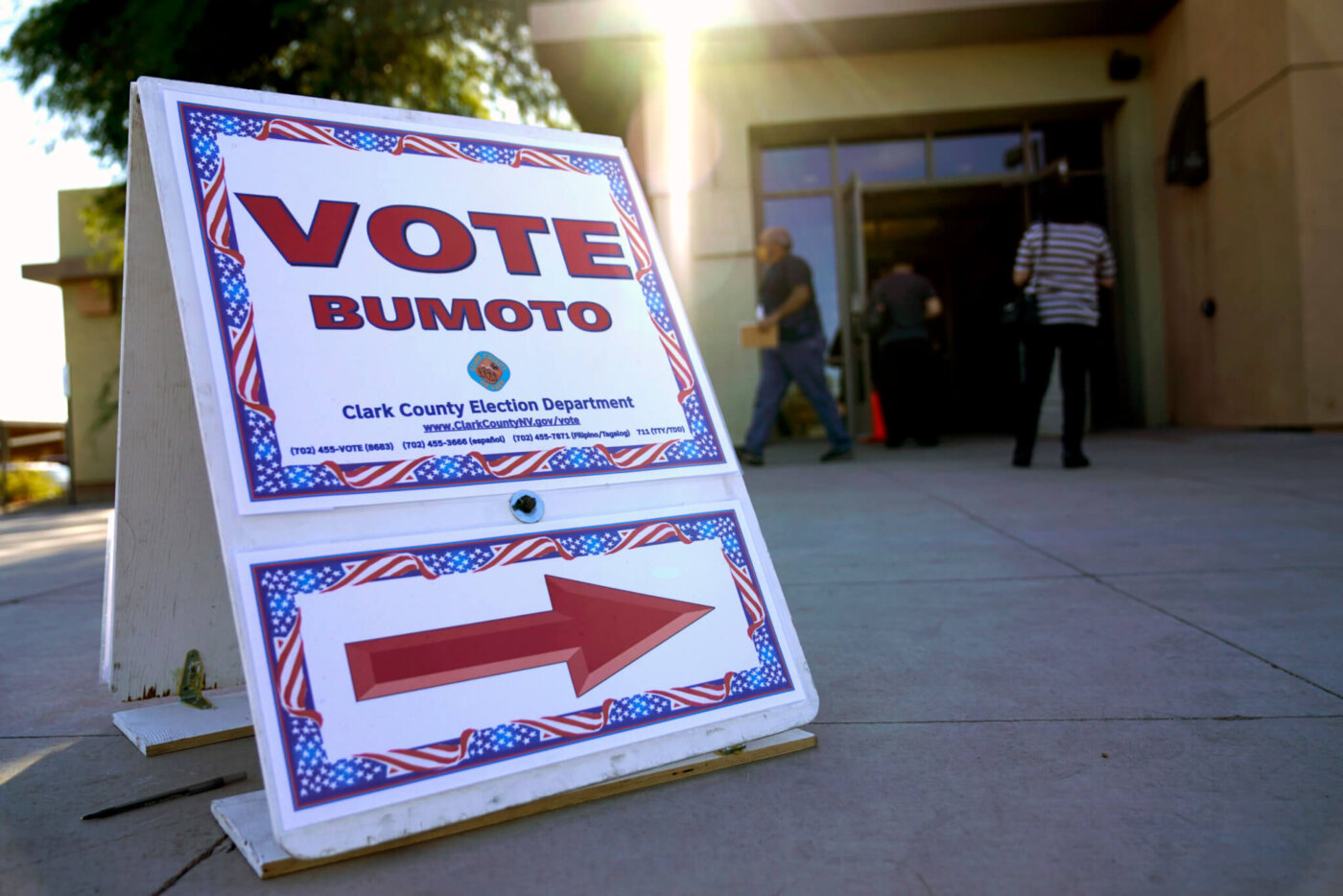
A sign directs people where to vote at a polling place during early voting in Las Vegas. (AP Photo/John Locher, File)
Voters in Nevada will find seven questions on their 2024 ballot this election. Here’s what those questions mean.
There are seven ballot questions that will be posed to voters this election, but what does that mean and how does your vote affect what happens with those initiatives?
The Nevada Secretary of State recently published a guide breaking down the seven statewide ballot questions, which includes background information and arguments for and against voting for each. If you don’t have time to read through 58 pages though, we’ve got you covered: Keep reading for the short and sweet version.
Four of the questions (Q1, Q2, Q4, and Q5) come from bills that were passed in the 2023 legislative session; if they receive a simple majority to pass, they will become law. One question was on the ballot in 2022 and appears exactly as it did then, question three — which, if passed again, will become law. The last two, questions six and seven, are new this year, and if passed, will be voted on again in 2026, since they aim to amend the state constitution.
Question 1 proposes amending the Nevada constitution to remove the Board of Regents of the Nevada System of Higher Education and to allow for additional legislative oversight of public higher education institutions through regular, independent audits.
The argument for: Could be a way for additional legislative oversight and accountability of the Board of Regents to improve public higher education in Nevada.
The argument against: The passage of this ballot question does not guarantee transparency, efficiency, and effectiveness of Nevada’s higher education system. In 2020, a similar question was on the ballot and failed to pass.
Question 2 proposes to update certain terms within the Nevada Constitution that describe people who benefit from state institutions. If approved, the measure would update the terms “insane” to “persons with significant mental illness,” “blind” to “persons who are blind or visually impaired,” and “deaf and dumb” to “persons who are deaf or hard of hearing.” It would also replace “institutions” with “entities.”
The argument for: The Nevada Constitution is frequently amended to replace offensive terms and reflect evolving society and language.
The argument against: Amending the Nevada Constitution should be a rare occurrence, and its language should not be changed simply to accommodate terminology that may be outdated.
Question 3 was voted on and passed during the 2022 midterm elections. If passed again, it will amend the Nevada Constitution to allow for open primaries and ranked-choice voting. This means voters will participate in a single primary election regardless of party affiliation or non-affiliation, and the top five primary candidates will advance to the general election, where the winner is determined by ranked-choice voting, which allows voters to rank their top candidates from most to least preferred.
If a candidate receives more than 50% in first place votes, they win. But if there isn’t a majority winner after counting voters’ first choices, it goes on to a process of elimination — the candidate with least votes is eliminated. Voters who ranked that candidate as their first choice will have their votes go to their second choice. The process goes on until there’s a candidate with more than half the votes. These changes would go into effect for the 2026 election cycle.
The argument for: Question 3 would give all Nevada voters the right to participate in Nevada’s primaries, regardless of their party registration. Additionally, with ranked-choice, voters won’t have to choose between the “lesser of two evils.”
The argument against: The new system could be complicated and time-consuming, and might take a while to get used to. The constitutional change would also be difficult to repeal if voters end up not liking the new system.
Question 4 proposes that the Nevada Constitution should be amended to remove language authorizing the use of slavery and involuntary servitude as a criminal punishment. Currently, the Nevada Constitution prohibits slavery and involuntary servitude, except as punishment for a crime for which a person has been convicted. (Yes, really.) This amendment would remove the exception, clarifying that slavery and involuntary servitude are prohibited in all circumstances. For a further breakdown watch this video.
The argument for: Slavery and involuntary servitude are morally unacceptable and should not exist in any form, even in the prison system.
The argument against: If approved, it could lead to unintended consequences within the criminal justice system relating to prison work assignments, such as cooks, community service, and voluntary work programs that provide life skills, job training, and rehabilitation.
Question 5 asks voters whether diapers should be exempt from the taxes imposed by the Sales and Use Tax Act of 1955. If approved, the sales and use tax exemptions for child and adult diapers will become effective on Jan. 1, 2025, and expire on Dec. 31, 2050.
The argument for: Diapers are considered basic healthcare necessities and the sales and use taxes place a financial burden on low-income families and other individuals who spend a larger percentage of their income each month on diapers.
The argument against: If passed, the estimated tax revenue loss for the state would be about $7.9 million.
Question 6 asks voters whether the Nevada Constitution should include an individual’s fundamental right to an abortion until fetal viability or around 24 weeks gestation. The amendment would also protect abortions necessary to protect the health or life of the pregnant individual at any point during the pregnancy. If the ballot measure receives a simple majority of the vote in November, it will then appear again on the 2026 ballot — a second passage is required to amend the state constitution.
The argument for: If passed, it would establish a more permanent layer of protection for abortion rights.
The argument against: Abortion is already legal in Nevada up to 24 weeks, and later if the mother’s and baby’s lives are at risk.
Question 7 would amend the Nevada Constitution to require voters to either present a photo ID when voting in-person or to provide certain personal information to verify their identity when voting by mail ballot. Eligible identification when voting in-person would include a Nevada driver’s license, ID card, employee photo ID card issued by government entities, US passport, US military ID card, student photo ID card issued by a Nevada public college, Tribal photo identification, and Nevada concealed firearms permit. Voters who vote by mail ballot would need to include the last four digits of their Nevada driver’s license number or the last four digits of their Social Security number with their ballot. If Q7 passes, it will be placed on the 2026 ballot for another vote.
The argument for: Requiring voters to show a photo ID will make elections more secure and give people more confidence in the results.
The argument against: Studies have shown that strict voter ID laws reduce turnout among underserved communities and communities of color, making it harder to have their voices heard at the ballot box.

La senadora Jacky Rosen logra conservar su escaño en reñida contienda electoral
Tras los resultados más recientes tabulados el jueves por la mañana, varios medios dieron a conocer que la contienda entre la actual senadora...

Race for Nevada US Senate seat called for Jacky Rosen by multiple outlets
Following the newest results tabulated Thursday morning, the race between Nevada Democratic incumbent US Sen. Jacky Rosen and Republican Sam Brown...

Un análisis de los resultados de las elecciones de 2024 en Nevada
Si bien Donald Trump ganó la presidencia y parece estar en camino de ganar en Nevada, su éxito no se traduce tanto para los republicanos que...

Harris says nation must accept election results while urging supporters to keep fighting
Harris delivered her remarks at Howard University, her alma mater and one of the country's most prominent historically Black schools, in the same...

Election fatigue? Here’s how to recharge your mental health
We all have our personal struggles in life, from work stress to relationship drama, but something about the 2024 election season simply felt...

Breaking down the 2024 election results in Nevada
While Donald Trump won the presidency and appears to be on track to winning Nevada, his success isn’t translating as much for down-ballot...





